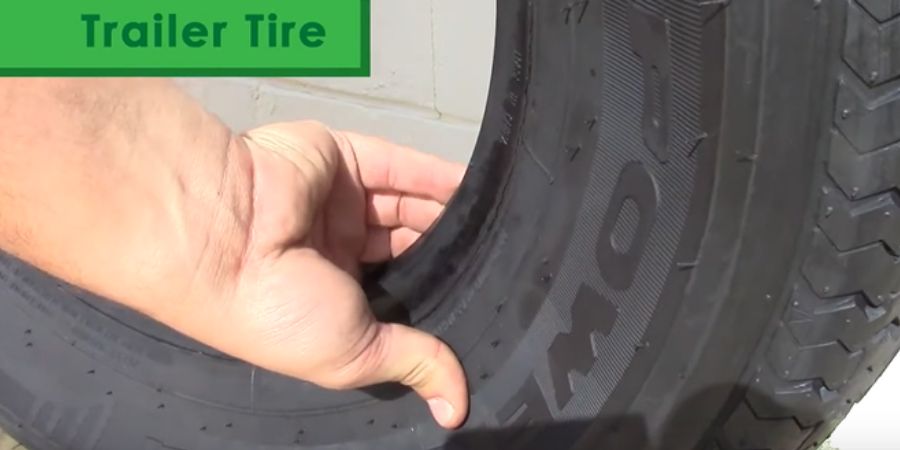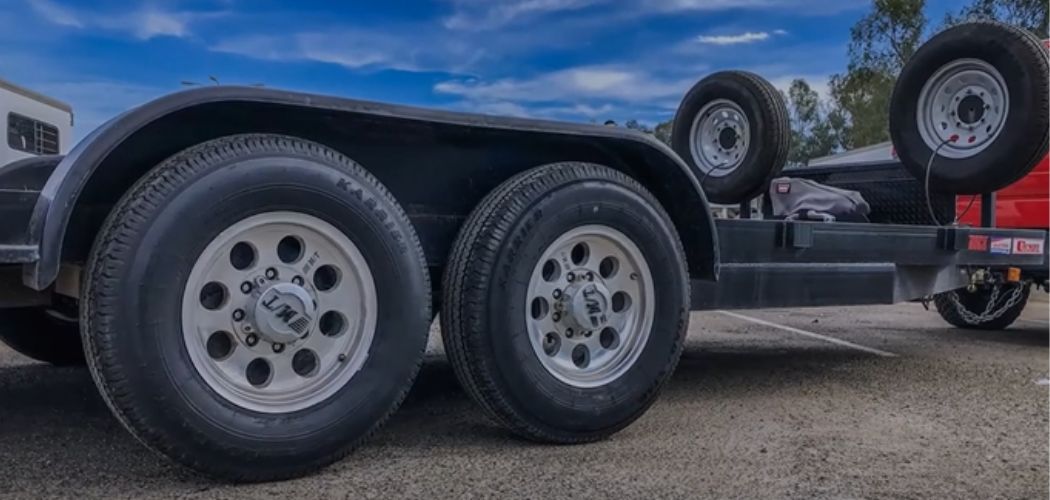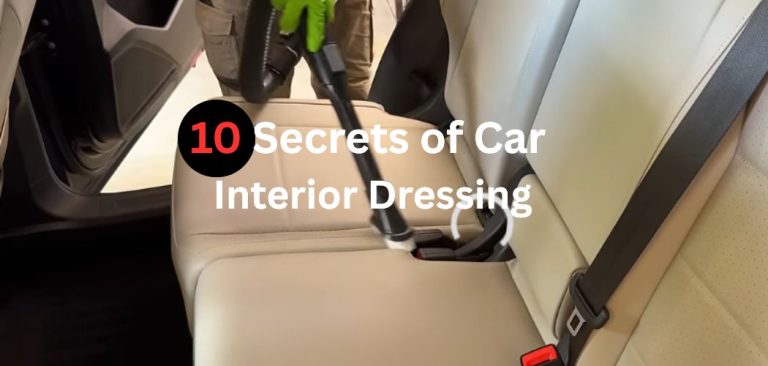No, you should not put trailer tires on a car. Trailer tires are designed for different uses and conditions than car tires.
Using them on a car can be unsafe and cause damage. Trailer tires and car tires serve distinct purposes. Trailer tires support heavy loads and maintain stability for trailers. Car tires handle driving, turning, and braking on roads. Putting trailer tires on a car can lead to poor handling and increased risk of accidents.
It is essential to use the correct tires for your vehicle to ensure safety and performance. This article will explore the differences and why trailer tires are not suitable for cars.
Trailer Tires Vs. Car Tires
Wondering if you can put trailer tires on a car? It’s important to understand the differences between trailer tires and car tires before making any changes. Let’s dive into the key differences and the purpose and design of each type of tire.
Key Differences
Trailer tires and car tires have distinct differences. These differences impact their performance and safety. Here are some key points to consider:
- Load Capacity: Trailer tires are built to carry heavy loads. Car tires are designed for comfort and handling.
- Sidewall Strength: Trailer tires have stiffer sidewalls. This helps them handle heavy loads and reduces sway.
- Tread Pattern: Trailer tires usually have a different tread pattern. This helps them stay stable when towing.
- Speed Rating: Car tires have higher speed ratings. Trailer tires are not built for high speeds.
Purpose And Design

The purpose and design of trailer tires and car tires are also different. Let’s explore these aspects:
Trailer Tires:
- Designed for carrying heavy loads
- Stiffer sidewalls to reduce trailer sway
- Different tread patterns for stability
- Lower speed ratings for safety
Car Tires:
- Made for comfort and handling
- Softer sidewalls for a smoother ride
- Tread patterns for traction and control
- Higher speed ratings for faster travel
Understanding these key differences and designs helps in choosing the right tire for your vehicle. Using the right tire ensures safety and optimal performance.
Safety Considerations
Thinking about putting trailer tires on a car? There are several safety considerations you need to keep in mind. Trailer tires are designed for different purposes compared to car tires. Understanding the impact on handling and braking performance can help you make an informed decision.
Impact On Handling
Trailer tires can significantly affect your car’s handling. They are designed to support heavy loads and maintain stability. This makes them less flexible than car tires. As a result, you may experience reduced cornering ability and less responsive steering.
Imagine taking a sharp turn. Your car tires grip the road and help you navigate smoothly. Trailer tires, on the other hand, could cause your car to understeer. This means the car may not turn as sharply as you intend. Over time, this can lead to uneven tire wear and poor handling.
Braking Performance
Braking performance is another critical factor. Car tires are engineered to provide optimal braking. They have a tread pattern that enhances grip and shortens stopping distance. Trailer tires are not designed with this in mind.
Using trailer tires on a car can increase your stopping distance. This is dangerous, especially in emergency situations. Reduced braking performance can lead to accidents. Always prioritize your safety and use tires designed for your vehicle.
Here’s a comparison table to summarize the differences:
| Aspect | Car Tires | Trailer Tires |
|---|---|---|
| Handling | Flexible and responsive | Stiff and less responsive |
| Braking | Optimal grip, short distance | Less grip, longer distance |
| Design Purpose | Performance and safety | Support heavy loads |
In summary, trailer tires are not suitable for cars. They impact handling and braking performance, which are critical for safety. Always choose the right tires for your vehicle.
Legal Implications
Putting trailer tires on a car is not just a mechanical decision. It involves considering the legal implications. Understanding these legal aspects can save you from fines, insurance issues, and safety risks.
Regulations And Compliance
Each region has specific laws regarding vehicle tires. Authorities often mandate car tires must meet certain standards for size, tread depth, and load capacity.
- Using trailer tires on cars can violate these standards.
- Regulations vary by state and country.
- Check your local vehicle code for details.
Non-compliance with tire regulations can result in fines. It may also lead to your car being deemed unroadworthy.
Insurance Concerns
Insurance companies have strict guidelines about vehicle modifications. Using trailer tires on a car can impact your policy.
- Insurance providers may refuse claims if your tires are non-compliant.
- You could face higher premiums.
- Policy cancellation is also a risk.
Discuss any tire changes with your insurer. Ensure your modifications are covered under your policy.
Performance Issues
Wondering about putting trailer tires on your car? This choice can affect your vehicle’s performance. Let’s explore the potential issues you might face.
Traction And Stability
Trailer tires aren’t designed for car use. They provide less traction. This can lead to slipping and sliding, especially in wet conditions. Stability is another concern. Trailer tires have different construction. They may not handle corners well, leading to a less stable ride.
Durability And Wear
Car tires and trailer tires wear differently. Trailer tires may wear out faster on cars. They aren’t built for the same stress. You might see uneven wear patterns. This can shorten the life of your tires. Frequent replacements could be needed, costing you more in the long run.
Expert Opinions
Experts suggest avoiding trailer tires on cars. They are not designed for the same load and speed requirements. Using them can lead to safety issues.
Understanding if you can put trailer tires on a car can be confusing. To clear things up, let’s look at what experts have to say. We’ll explore insights from mechanics and industry standards.
Mechanics’ Advice
Most mechanics advise against using trailer tires on cars. Trailer tires are designed differently. They handle loads, not dynamic driving. Car tires must ensure safe handling and braking. Trailer tires lack these qualities. Using them can compromise safety. Mechanics also point out that trailer tires are often stiffer. This can lead to a harsh ride. You might feel every bump on the road.
Industry Standards
Industry standards highlight the differences between car and trailer tires. Car tires meet specific safety and performance criteria. Trailer tires have different standards. They focus on load-bearing capacity. The Rubber Manufacturers Association (RMA) sets guidelines. They state that trailer tires should not be used on cars. Mixing tire types can lead to uneven wear. It may also affect your car’s alignment. In summary, experts agree. Putting trailer tires on a car is not advisable. Your safety and comfort may be at risk. “`
Alternatives To Trailer Tires
Considering alternatives to trailer tires for your car is essential. Trailer tires are designed for different purposes than car tires. They may not provide the safety and performance you need on the road. Below, we explore some suitable alternatives.
Suitable Car Tire Options
When choosing tires for your car, you need to focus on safety, performance, and compatibility. Here are some suitable car tire options:
- All-Season Tires: These tires offer a balanced performance in various weather conditions. They are durable and provide a smooth ride.
- Summer Tires: Perfect for warm weather, these tires offer excellent grip and handling on dry and wet roads.
- Winter Tires: These tires are designed for cold weather, providing better traction on snow and ice.
- Performance Tires: Ideal for high-speed driving, these tires enhance handling and cornering abilities.
Specialty Tires
Sometimes, you need tires designed for specific driving conditions or vehicles. Specialty tires offer unique benefits for particular needs:
- All-Terrain Tires: Great for off-road adventures, these tires provide excellent traction on rough terrain.
- Run-Flat Tires: These tires allow you to drive for a short distance even after a puncture.
- Eco-Friendly Tires: Designed to reduce rolling resistance, these tires improve fuel efficiency.
- Touring Tires: These provide a comfortable ride with long-lasting tread life, ideal for long-distance travel.
Choosing the right tire is crucial for your vehicle’s safety and performance. Always ensure the tires you select match your driving needs and conditions.
Cost Analysis
When deciding whether to put trailer tires on a car, cost is a key factor. Let’s delve into the costs involved and compare them with regular car tires.
Price Comparison
Trailer tires are often cheaper than car tires. This initial cost difference can be attractive. For example, a trailer tire might cost around $50, while a car tire may cost $100 or more. This price gap can save money upfront. But it’s crucial to consider more than just the purchase price.
Long-term Expenses
Trailer tires are designed for different purposes than car tires. They wear out faster on a car. Frequent replacements could lead to higher expenses over time. Car tires, though more expensive initially, offer better durability and performance. This means fewer replacements and better fuel efficiency. So, while trailer tires may seem cheaper, they might cost more in the long run.

Real-world Scenarios
Many car owners ponder if they can put trailer tires on their cars. To understand this, let’s explore real-world scenarios. These case studies and user experiences will help you decide.
Case Studies
In a case study from Texas, a car owner tried trailer tires on his sedan. He used the car for short trips within the city.
Scenario | Outcome |
Short city drives | Experienced rough rides and poor handling |
The study showed the car had rough rides and poor handling. The car also needed tire replacements sooner than expected.
Another case study from Florida involved a small SUV using trailer tires for a week-long road trip.
- Long-distance travel
- Experienced tire blowouts on highways
This case reported several tire blowouts on highways. The car had to be towed twice during the trip.
User Experiences
Many users shared their experiences online. One user from California put trailer tires on his compact car for a month. He drove mainly on highways.
- Highway driving
- Noticed increased noise and vibration
He noticed increased noise and vibration, making his drives uncomfortable. Another user from New York tried trailer tires on her family van.
- Family van use
- Found the tires wore out quickly
She found the tires wore out quickly, causing her to replace them often.
These user experiences highlight common issues. Rough rides, quick wear, and safety concerns are frequent. Putting trailer tires on a car is not recommended based on these real-world scenarios.
Frequently Asked Questions
Can Trailer Tires Be Used On A Car?
No, trailer tires are designed differently from car tires. They lack the necessary traction and durability for car use.
What Are The Risks Of Using Trailer Tires On A Car?
Using trailer tires on a car can lead to poor handling and increased risk of accidents. They are not made for the stresses of car driving.
Are Trailer Tires And Car Tires The Same?
No, trailer tires and car tires have different constructions and purposes. Trailer tires are designed for load-bearing, not for driving.
Can Trailer Tires Affect Car Performance?
Yes, trailer tires can negatively impact car performance. They provide poor traction and handling, making driving unsafe.
Conclusion
Trailer tires on a car? Not a good idea. They differ in design. Trailer tires handle loads differently. Car tires provide better performance and safety. Mixing them can be risky. Stick to car tires for cars. Ensuring safety and comfort is crucial.
Choose the right tire for the right vehicle. Your car will thank you. Stay safe on the road.







